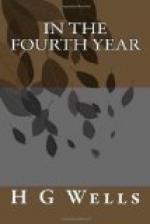All the talk, all the aspiration and work that is making now towards this conception of a world securely at peace, under the direction of a League of Free Nations, has interwoven with it an idea that is often rather felt than understood, the idea of Democracy. Not only is justice to prevail between race and race and nation and nation, but also between man and man; there is to be a universal respect for human life throughout the earth; the world, in the words of President Wilson, is to be made “safe for democracy.” I would like to subject that word to a certain scrutiny to see whether the things we are apt to think and assume about it correspond exactly with the feeling of the word. I would like to ask what, under modern conditions, does democracy mean, and whether we have got it now anywhere in the world in its fulness and completion.
And to begin with I must have a quarrel with the word itself. The eccentricities of modern education make us dependent for a number of our primary political terms upon those used by the thinkers of the small Greek republics of ancient times before those petty states collapsed, through sheer political ineptitude, before the Macedonians. They thought in terms of states so small that it was possible to gather all the citizens together for the purposes of legislation. These states were scarcely more than what we English might call sovereign urban districts. Fast communications were made by runners; even the policeman with a bicycle of the modern urban district was beyond the scope of the Greek imagination. There were no railways, telegraphs, telephones, books or newspapers, there was no need for the state to maintain a system of education, and the affairs of the state were so simple that they could be discussed and decided by the human voice and open voting in an assembly of all the citizens. That is what democracy, meant. In Andorra, or perhaps in Canton Uri, such democracy may still be possible; in any other modern state it cannot exist. The opposite term to it was oligarchy, in which a small council of men controlled the affairs of the state. Oligarchy, narrowed down to one man, became monarchy. If you wished to be polite to an oligarchy you called it an aristocracy; if you wished to point out that a monarch was rather by way of being self-appointed, you called him a Tyrant. An oligarchy with a property qualification was a plutocracy.
Now the modern intelligence, being under a sort of magic slavery to the ancient Greeks, has to adapt all these terms to the problems of states so vast and complex that they have the same relation to the Greek states that the anatomy of a man has to the anatomy of a jellyfish. They are not only greater in extent and denser in population, but they are increasingly innervated by more and more rapid means of communication and excitement. In the classical past—except for such special cases as the feeding of Rome with Egyptian corn—trade was a traffic in luxuries




